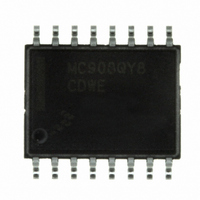MC908QY8CDWE Freescale Semiconductor, MC908QY8CDWE Datasheet - Page 167

MC908QY8CDWE
Manufacturer Part Number
MC908QY8CDWE
Description
IC MCU 8BIT 8K FLASH 16-SOIC
Manufacturer
Freescale Semiconductor
Series
HC08r
Datasheet
1.MC908QB8CDWE.pdf
(236 pages)
Specifications of MC908QY8CDWE
Core Processor
HC08
Core Size
8-Bit
Speed
8MHz
Peripherals
LVD, POR, PWM
Number Of I /o
13
Program Memory Size
8KB (8K x 8)
Program Memory Type
FLASH
Ram Size
256 x 8
Voltage - Supply (vcc/vdd)
2.7 V ~ 5.5 V
Data Converters
A/D 4x10b
Oscillator Type
External
Operating Temperature
-40°C ~ 85°C
Package / Case
16-SOIC (0.300", 7.5mm Width)
Processor Series
HC08QY
Core
HC08
Data Bus Width
8 bit
Data Ram Size
256 B
Maximum Clock Frequency
8 MHz
Number Of Programmable I/os
13
Number Of Timers
2
Operating Supply Voltage
3 V to 5 V
Maximum Operating Temperature
+ 85 C
Mounting Style
SMD/SMT
Development Tools By Supplier
FSICEBASE, M68CBL05AE, DEMO908QB8, DEMO908QC16
Minimum Operating Temperature
- 40 C
On-chip Adc
4-ch x 10-bit
Lead Free Status / RoHS Status
Lead free / RoHS Compliant
Eeprom Size
-
Connectivity
-
Lead Free Status / Rohs Status
Lead free / RoHS Compliant
Available stocks
Company
Part Number
Manufacturer
Quantity
Price
Company:
Part Number:
MC908QY8CDWE
Manufacturer:
Winbond
Quantity:
16 700
Part Number:
MC908QY8CDWE
Manufacturer:
FREESCALE
Quantity:
20 000
- Current page: 167 of 236
- Download datasheet (3Mb)
In a slave SPI (MSTR = 0), MODF generates an SPI receiver/error interrupt request if the ERRIE bit is
set. The MODF bit does not clear the SPE bit or reset the SPI in any way. Software can abort the SPI
transmission by clearing the SPE bit of the slave.
To clear the MODF flag, read the SPSCR with the MODF bit set and then write to the SPCR register. This
entire clearing mechanism must occur with no MODF condition existing or else the flag is not cleared.
15.4 Interrupts
Four SPI status flags can be enabled to generate interrupt requests. See
Reading the SPI status and control register with SPRF set and then reading the receive data register
clears SPRF. The clearing mechanism for the SPTE flag is requires only a write to the transmit data
register.
The SPI transmitter interrupt enable bit (SPTIE) enables the SPTE flag to generate transmitter interrupt
requests, provided that the SPI is enabled (SPE = 1).
The SPI receiver interrupt enable bit (SPRIE) enables SPRF to generate receiver interrupt requests,
regardless of the state of SPE. See
Freescale Semiconductor
A high on the SS pin of a slave SPI puts the MISO pin in a high impedance
state. Also, the slave SPI ignores all incoming SPSCK clocks, even if it was
already in the middle of a transmission.
SPTE
Transmitter empty
SPRF
Receiver full
OVRF
Overflow
MODF
Mode fault
ERRIE
MODF
OVRF
Figure 15-11. SPI Interrupt Request Generation
Flag
SPRIE
SPTE
Figure
MC68HC908QB8 Data Sheet, Rev. 3
Table 15-1. SPI Interrupts
SPTIE
SPRF
SPI transmitter interrupt request
(SPTIE = 1, SPE = 1)
SPI receiver interrupt request
(SPRIE = 1)
SPI receiver/error interrupt request
(ERRIE = 1)
SPI receiver/error interrupt request
(ERRIE = 1)
15-11.
SPE
NOTE
Request
SPI TRANSMITTER
INTERRUPT REQUEST
SPI RECEIVER/ERROR
INTERRUPT REQUEST
Table
15-1.
Interrupts
167
Related parts for MC908QY8CDWE
Image
Part Number
Description
Manufacturer
Datasheet
Request
R
Part Number:
Description:
Manufacturer:
Freescale Semiconductor, Inc
Datasheet:
Part Number:
Description:
Manufacturer:
Freescale Semiconductor, Inc
Datasheet:
Part Number:
Description:
Manufacturer:
Freescale Semiconductor, Inc
Datasheet:
Part Number:
Description:
Manufacturer:
Freescale Semiconductor, Inc
Datasheet:
Part Number:
Description:
Manufacturer:
Freescale Semiconductor, Inc
Datasheet:
Part Number:
Description:
Manufacturer:
Freescale Semiconductor, Inc
Datasheet:
Part Number:
Description:
Manufacturer:
Freescale Semiconductor, Inc
Datasheet:
Part Number:
Description:
Manufacturer:
Freescale Semiconductor, Inc
Datasheet:
Part Number:
Description:
Manufacturer:
Freescale Semiconductor, Inc
Datasheet:
Part Number:
Description:
Manufacturer:
Freescale Semiconductor, Inc
Datasheet:
Part Number:
Description:
Manufacturer:
Freescale Semiconductor, Inc
Datasheet:
Part Number:
Description:
Manufacturer:
Freescale Semiconductor, Inc
Datasheet:
Part Number:
Description:
Manufacturer:
Freescale Semiconductor, Inc
Datasheet:
Part Number:
Description:
Manufacturer:
Freescale Semiconductor, Inc
Datasheet:
Part Number:
Description:
Manufacturer:
Freescale Semiconductor, Inc
Datasheet:











